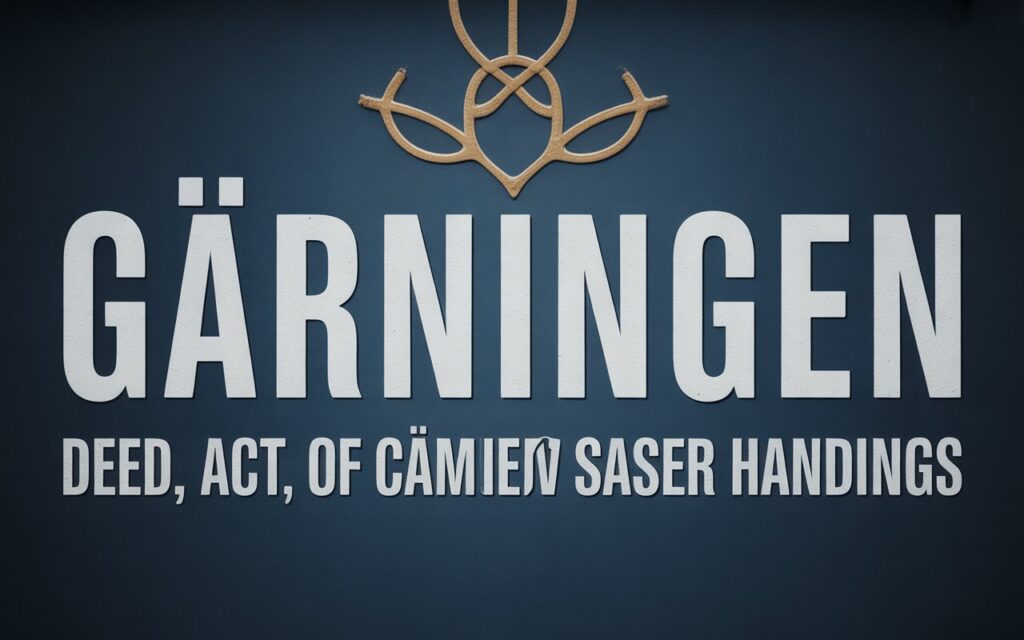Gärningen: The Simple Word With a Powerful Meaning

Have you ever heard someone say the word Gärningen and wondered why it sounds so serious? At first, it may look like just another Swedish word. But when you look closer, you find that Gärningen is much deeper than it seems. It is used in law, culture, stories, crime shows, and even in everyday talk. It is a word that carries weight, emotion, and responsibility.
In this article, we will explore what Gärningen really means, where it comes from, and why it matters so much in Swedish life. We will take it step by step and make everything very simple and easy to understand.
What Does Gärningen Really Mean?
The basic meaning of Gärningen is “the act” or “the deed.”
But this simple translation does not show the full picture.
In Swedish, people use Gärningen to talk about actions that truly matter. These actions may be good, bad, brave, or shocking — but they are always important. You would not use this word for brushing your teeth or cooking lunch. Instead, you might hear it when someone talks about a crime, a heroic act, or a turning point in a story.
Think of it like this:
If someone says, “He was responsible for Gärningen,” they mean the act that changed everything.
This is why the word feels strong. It makes people pause and pay attention, because it shows that the action being discussed is serious and meaningful.
Where the Word Gärningen Comes From
The story of the word is actually very old.
Gärningen comes from the root göra, which means “to do” or “to make.” Long ago, in the time of the Vikings, a similar word — gørning — was used for an act that had real impact. It could be an act of courage, an act of betrayal, or an act that shaped a whole village.
Over time, the word changed, but the meaning stayed strong. The ending “-ningen” makes it definite. So Gärningen doesn’t mean just any act — it means the act, the one specific action that really matters.
This is why even today, Swedes use the word for moments that leave a mark, whether good or bad.
Why Gärningen Is So Important in Swedish Culture
In Swedish culture, people often believe that actions speak louder than words. Your words may sound nice, but your deeds show who you really are. And this is why Gärningen is so meaningful.
Imagine someone helps a stranger on a cold winter night. That kind act becomes their Gärningen — something people remember.
Now imagine someone harms another person. That act becomes their Gärningen, too — a serious deed that people also remember.
In Sweden, both sides matter. The good and the bad.
That is why parents, teachers, and even workplaces often talk about the value of doing the right thing. The focus is not just on what you say, but on what you actually do.
So when Swedes talk about Gärningen, they are really talking about responsibility, honesty, and the idea that every act has meaning.
How Gärningen Works in Swedish Law
One of the places where Gärningen matters the most is the courtroom.
In Swedish law, the word points to the exact action a person is accused of doing. Police, lawyers, and judges must study this act very closely.
For example:
- What happened?
- Where did it happen?
- How did it happen?
- Who was involved?
- What was the result?
The court always starts with Gärningen, because the act is the core of every case. Intent also matters, of course, but nothing can be judged until the act itself is clear.
This is similar to the idea of Actus Reus in British or American law — the “guilty act.”
But Gärningen feels a bit broader. It covers not only crime, but also the idea that an act has weight, and that weight must be understood before making any decision.
This careful approach keeps the Swedish justice system fair and focused on facts, not guesses or emotions.
How Gärningen Shapes News and Public Opinion

If you read Swedish news, you will see Gärningen used often.
Reporters use it to describe serious events, especially crimes. But they use it in a calm and respectful way. Swedish news tries to stay neutral, avoid drama, and protect both victims and suspects.
Instead of emotional words, they write things like:
- “The police are still investigating Gärningen.”
- “New clues were found at the scene of Gärningen.”
This helps the public focus on what actually happened, not rumors or fear. It also stops people from jumping to conclusions before the facts are clear.
But because the word is so powerful, it also grabs attention.
A headline with Gärningen makes people want to know more. It tells readers that something important — not small or ordinary — has taken place.
Gärningen in Crime Shows, Books, and Movies
If you watch shows like Wallander, Beck, or The Bridge, you will hear Gärningen many times. Detectives use the word when they want to understand the crime itself, not just the people involved.
For example, a character might say:
- “We need to understand Gärningen.”
- “Everything started with Gärningen.”
Writers love this word because it adds drama and mystery.
It helps build tension and makes the story feel serious and real. The whole plot of a crime show often revolves around understanding the act — what happened, why it happened, and how it changed everything.
This is exactly how Gärningen is used in real life too, which is why it works so well in stories.
Gärningen and Personal Responsibility
Behind every act is a person. And behind every person is a choice.
This is why Gärningen also connects deeply to personal growth and psychology.
Think about this:
Have you ever done something and later felt proud of it?
Or maybe you did something you regret?
That feeling comes from the act itself, not just the thought behind it.
In psychology, people talk about:
- guilt
- regret
- responsibility
- learning from mistakes
These feelings come after the act — after Gärningen.
This is what makes the word so powerful. It reminds us that our actions shape our future, our relationships, and even the way we see ourselves.
Gärningen in Old Stories and Modern Culture

In old Nordic tales, heroes and villains were known by their deeds. Odin was respected for the acts he took to gain wisdom. Loki was feared because of his acts of mischief. Their Gärningar defined them.
The same idea continues in modern culture.
People admire bold actions — standing up for others, helping in danger, speaking out for justice.
People also fear harmful actions — betrayal, violence, or cruelty.
A single Gärning can start a movement.
A single Gärning can become the story people tell for years.
This is how deeply action is woven into Swedish thinking.
How Gärningen Affects Victims and Communities
Every act leaves a mark, and Gärningen often has the biggest mark of all. When a serious act happens, the people involved feel it in their daily lives. A victim may feel fear, sadness, or confusion long after the event is over. They may replay the moment in their mind again and again, trying to understand what happened.
Communities also feel the weight of Gärningen. Think of a small town facing a major crime. People come together to talk, support each other, or hold a candlelight vigil. Even if they were not there when the act happened, they still feel its effect. The act becomes something the whole community works through together.
This is why Sweden has many support groups and help centers. They offer counseling, advice, and comfort to anyone affected by a serious act. Their goal is simple: to help people heal and feel safe again after Gärningen changes their world.
How One Gärning Can Change Laws and Society
Sometimes one single act is so strong that it leads to change far beyond the people involved. A shocking Gärning may show gaps in the system. It might reveal unfair rules or weak protection for certain groups. When this happens, people demand change.
For example, a major crime could lead to new laws, stricter safety rules, or better support for victims. Politicians may discuss the act in parliament. Reporters may write about it for weeks. Families and groups may speak out and share their stories. The act becomes a symbol for a bigger problem that needs to be fixed.
In this way, Gärningen can start movements, bring new ideas into the public eye, and shape how a whole country thinks about justice, fairness, and safety. A single deed can push a nation to grow.
Gärningen in Swedish Social Media and Memes
Even though Gärningen is a serious word, Swedes sometimes like to use it in funny and dramatic ways. Online, you may see memes of cats knocking over plants or dogs stealing a sandwich with the caption, “Gärningen är klar” — “The act is done.”
This playful use of the word shows how language changes over time. People enjoy taking a serious word and using it in a light or silly moment. It creates humor because the word feels too big for the small action. It is like calling a spilled cup of coffee “a great crime.” That contrast makes people laugh.
These jokes also help younger Swedes connect to older cultural ideas. They learn the weight of the word Gärningen, but they also see how language can be fun and creative at the same time.
Gärningen in Swedish Religion and Philosophy
The meaning of Gärningen also appears in old ideas, religious thinking, and deep questions about life. In Swedish Lutheran roots, people often talked about the importance of good deeds, called “goda gärningar.” The belief was simple: your actions should match your values.
Philosophers also ask big questions about acts. They discuss whether our actions come from free will or from our past, our habits, or our environment. They ask if the intention matters more than the act, or if the act matters more than the intention. These questions help people think deeply about why we do what we do.
In Sweden, the act itself often carries more weight. A person may say, “You are what you do.” This shows how strongly Swedes connect identity to action. Your Gärningen becomes a part of your story — the part that cannot be erased once it is done.
How Other Cultures Think About Actions
Even though Gärningen is a Swedish word, other cultures have similar ideas. In Japan, people talk about “giri,” which means duty, and “haji,” which means shame. These ideas shape how people act and how they think others see them.
In Islamic belief, the word “niyyah” means intention, and it plays a big role in understanding whether an act is good or bad. In some Asian cultures shaped by Confucian ideas, people focus on the harmony of the group. They judge actions based on how they affect peace and balance.
These examples show something important: every culture cares about actions. They may use different words, but the idea is the same. What we do matters. Gärningen fits into this global picture as Sweden’s way of showing how serious and meaningful acts are.
Gärningen in Psychology: Why We Act and How We Learn
To truly understand Gärningen, we must also understand how the human mind works. Psychology teaches us that every action comes from a mix of thought, emotion, social pressure, and habit. Sometimes we act because we think carefully. Other times, we act out of fear, joy, anger, or impulse.
When the act is done, we deal with the feelings that follow. If the act was good, we may feel pride and strength. If the act was harmful, we may feel guilt or regret. These emotions help us learn. They guide us toward better choices in the future.
Behavioral psychology also shows that many acts are learned. We repeat what works. We avoid what hurts. This means Gärningen is not always a planned act. It can be automatic, shaped by our past, our environment, or the people around us.
This is why understanding the act is so important in therapy and personal growth. Once you explore why you did something, you can grow beyond it.
Gärningen in Modern Media and True Crime Stories

You may notice that true crime shows, movies, and documentaries spend most of their time focusing on the act itself. Viewers want to know what happened, how it happened, and why it happened. The moment of Gärningen becomes the center of the whole story.
But there is something else to notice. How the media shows the act can change how the public sees it. The same act can look like self-defense, or it can look like aggression — depending on how it is filmed, edited, or explained.
This is why Swedish reporters are careful with their words. They focus on facts. They use neutral phrases. They avoid guessing. By doing this, they make sure the public understands the true weight of Gärningen without fear or bias.
Restorative Justice: Healing After Gärningen
Restorative justice is another area where Gärningen plays a big role. Instead of focusing only on punishment, this approach looks at healing. It asks:
- Why did the act happen?
- Who was hurt?
- What needs to be done to repair the harm?
Victims and offenders may meet with trained helpers. They talk about the act, the pain it caused, and what can be done to move forward. This is not an excuse. It is a method to understand the impact of the act and to rebuild trust.
In this model, Gärningen becomes a starting point for change. It helps both sides grow and helps communities heal after something painful.
Final Thoughts: Why Gärningen Truly Matters
Now that you have read the full article, you can see that Gärningen is much more than a simple word. It holds history, emotion, culture, law, psychology, and even humor inside it. It reminds us that every act has meaning — whether it is a brave deed, a harmful choice, a social moment, or a personal mistake.
Understanding this word helps us understand Sweden better. But it also helps us understand ourselves. Our lives are built from the acts we choose. One deed can change a day. One deed can change a life. One deed can change a country.
So the next time you hear the word Gärningen, pause for a moment.
Think about the act being discussed.
Think about what it means.
And remember that every small choice can shape the world around you.



